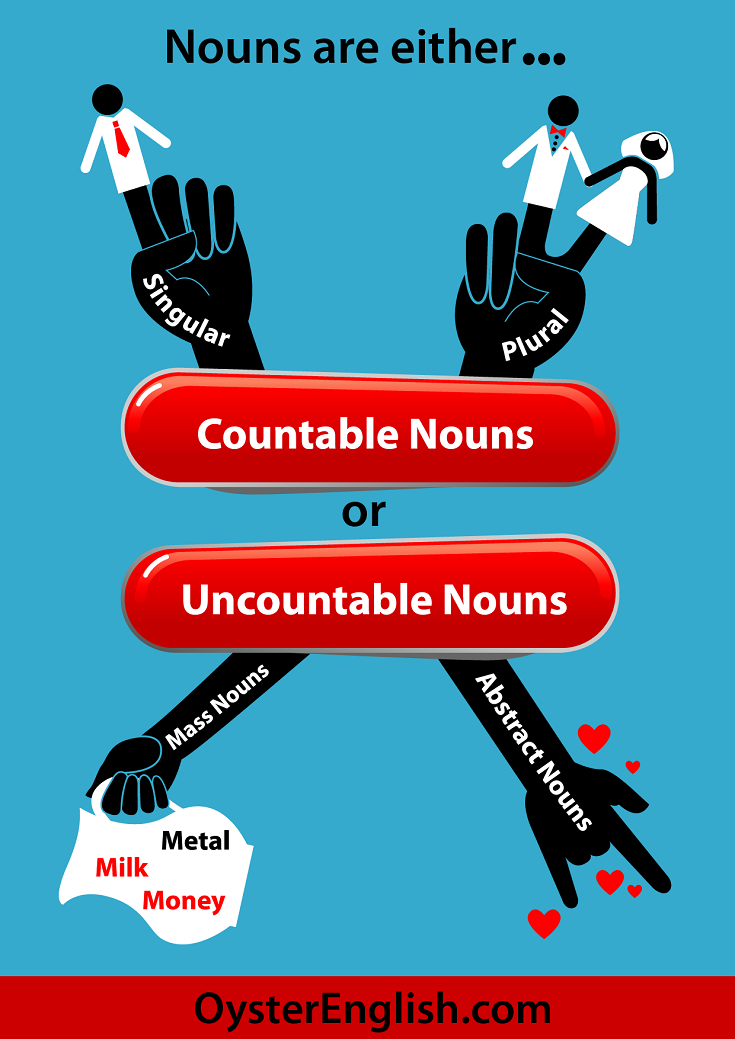All About Countable & Uncountable Nouns
Countable or uncountable nouns? These concepts can be frustrating for English learners but it's not as hard as it seems. These explanations will make it easier to understand.
A quick reminder: A noun is a word which names a person, place, thing, animal or idea.
All common nouns are either countable or uncountable.
Countable Nouns
Countable nouns are things that you can count. When we say "count" we mean adding things together to get a total number such as three cats, five pencils, one train.
Examples of countable nouns:
book, magazine, table, chair, sofa, computer, mouse, dog, orange, sand, bottle, car, rug, radio, clock, pen.
Since we can count them, countable nouns can be either singular (just one single thing) or plural (more than one thing):
- Star Wars is a great movie.
- I watched two movies last night.
Uncountable (also called “uncount” or “mass” nouns)
Uncountable nouns are difficult to count or divide into separate parts. Uncountable nouns are also called "mass" nouns. The word mass refers to a large amount of a substance that has no particular shape.
|
Uncountable noun types Liquids or gases |
Examples water, coffee, milk, air, oxygen |
|
Tiny objects |
powder, sand, rice, flour, grain, dirt, dust |
|
Abstract ideas and concepts |
love, sadness, safety, freedom, power |
|
Categories / Grouped concepts |
furniture, music, luggage, money, currency |
|
Materials |
wood, metal, plastic |
|
School subjects |
mathematics, chemistry, Italian, economics |
|
Energy related words |
electricity, radiation, heat, sunshine |
Articles and Determiners with Countable/Uncountable Nouns
We can use the indefinite articles a / an with singular countable nouns:
- I’d like an apple and a banana. (not: I’d like apple and banana.)
We can use determiners (e.g, the, this, these, those, his, my) with countable nouns:
- Those are her children.
- His car is very small.
- The television isn’t working.
Uncountable nouns are singular. You cannot make them plural, therefore:
- Do not add –s to uncountable nouns. (wrong: I have three luggages to check-in)
- Do not use a / an or a number in front of them.
When a countable noun is plural, we don’t need a determiner if were talking about something in general.
- I eat apples every day.
- Flowers are beautiful. (Flowers in general are beautiful. If we say “the flowers” we are talking about some specific flowers).
- Are girls more nurturing than boys or do we raise them that way? (general: all girls, all boys).
Quantifiers and Countable / Uncountable Nouns
We can use many and few with plural countable nouns:
- There are many cars on the road during rush-hour traffic.
- Since I stopped smoking there are few problems with my health.
We can use some and any with either plural countable or uncountable nouns:
- There are some books on the shelf. (books = countable/ plural noun)
- Do you have some money I could borrow? (money = uncountable noun)
- I don’t have any time to go to the gym today. (time = uncountable noun)
We can use much and little with uncountable nouns.
- There isn’t much hot water left after 9 AM.
- Could I have a little milk for my coffee?
- It makes little sense to spend money on the lotto.
Using Partitives with Uncountable Nouns
Partitive expressions make it possible to make uncountable nouns countable. What’s a partitive?
Partitives are words that express a container or unit of measurement.
For example:
glass, bottle, can, box, cup, spoon full, handful, bunch, loaf, piece, slice, scoop, grain, kilo, etc.
Once you put the uncountable nouns inside of these containers, then we can count them. This is why we typically use the partitive followed by the word “of”:
- Would you like another slice of cake?
- I’ll order a glass of wine or shall we share a bottle of wine?
- I’d like a kilo of flour please.
- I drink 10 bottles of beer last night and I felt terrible.
- Please put two scoops of rice in the rice maker.
NOTE: Often in English you will hear people use a number before an uncountable noun. This is confusing! For example, although coffee is an uncountable noun. It’s a liquid so you can’t count it. But you can measure it or put it inside a container and count the number of containers.
So for example you may hear someone say they normally drink three coffees a day. What they’re really saying is that they drink three cups of coffee each day.
Nouns that can be Countable or Uncountable
To make things a little complicated, some nouns can be both countable or uncountable. It depends on the meaning you are trying to convey. For example:
|
Uncountable (conveys a general meaning) You look good with long hair. (general meaning - all the hair on your head) |
Countable (conveys a specific meaning) The police found two hairs at the crime scene. |
|
My skin is very dry. |
The purse is made of several snake skins. |
|
Do you recycle paper? |
I left some papers on the printer. |
Remember your friend Ms. Dictionary? She uses the following symbols to tell you whether a noun is countable [C] or uncountable [U]. I always recommend learners purchase a quality dictionary—there’s so much valuable information in them.
- Home Page ›
- Main Grammar Page ›
- Nouns ›
- Uncountable Nouns"

